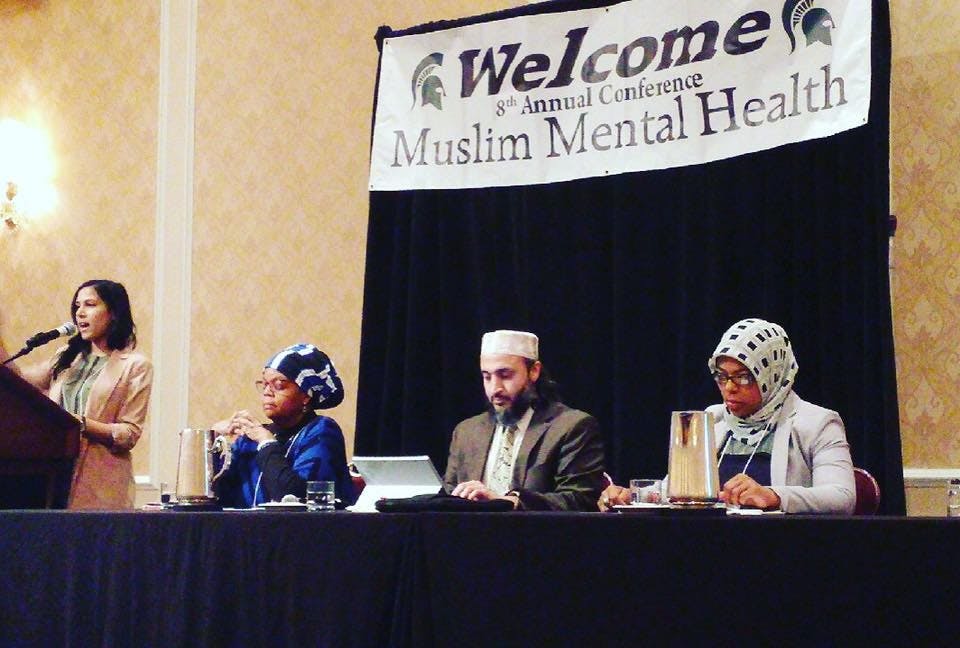The ninth annual Muslim Mental Health Conference will be held at the East Lansing Marriott Hotel from April 13-14.
Dr. Farha Abbasi, assistant professor in the MSU Department of Psychiatry, is a member of the program committee who helped create the conference.
“The reason I did this was as a mental health provider, I was concerned that we are living in a very Muslim-majority area, but we were not seeing many Muslim patients at the clinic,” Abbasi said. “I was concerned, what are the barriers to access, and when I started working, I realized there’s a lot of stigma around mental illnesses, and that’s why I created this conference, and the goals of the conference were creating awareness, acceptance and improving access to the care.”
The Muslim Mental Health Conference is open to attendees of all faiths, and it will feature film screenings, group meals and prayer sessions along with panels of experts discussing mental health issues in the Muslim community.
Sohail Chaudhry, the imam at the Islamic Center of East Lansing, will be one of the hosts of the conference. Though religion and science can conflict, Chaudhry said he focuses on working alongside science and providing religious support.
“From the Islamic perspective, there is no contradiction between something that is factually scientific — because it deals with human nature — the human mind and religion, because the source of both is the same, God almighty,” Chaudhry said.
The focus of the 2017 conference will be addiction. Abbasi said there is a stigma around addiction in the Muslim community, but the imams she has talked to want to learn to treat addiction as a sickness rather than as a sin.
“We realized there’s so much stigma around addiction that it’s almost never taken as a disease, it’s taken as weakness of the soul or a sin, that it’s the same if you’re addicted to something,” Abbasi said. “Because we’re going to have so many imams there, we did a preliminary survey last year and a training around opiate epidemic and realized that there is such a huge need, and the imams wanted this training. So leaders realized that this is an issue that needs to come out in the open, and we needed to have a conversation about it.”
Dr. Cynthia Arfken, a researcher from Wayne State University, will be one of the conference’s speakers on the topic of addiction.
Since Islamic teachings frown upon drinking alcohol, Muslim-majority countries tend to have low rates of alcohol use, Arfken said. Arfken said young Muslim men tend to turn to binge drinking when they are away from their home communities, feel acculturated in their own country and are not very religious themselves.
Despite the low rates of alcohol use, there are significant addiction problems in the Muslim world. The majority-Muslim country of Afghanistan is the world’s leading supplier of opiates, and several of the surrounding countries have high addiction rates because of the opiates supplied by Afghanistan. In the United States, Arfken said the Obama administration spent more resources on addiction recently than in previous years, but young Americans — Muslim and otherwise — are still dying from opioid addiction.
Arfken said successful recovery from opioid addiction is often linked to support from the family and community, and this is where the religious faith community can help people recover from addictions. At the Muslim Mental Health Conference, Arfken will be part of a panel introducing the topic of addiction to the conference on Friday morning.
The conference will also address several other topics; for example, there will be a panel on refugees, and Dr. Steve Olweean will be one of the speakers on this panel. Olweean is a PhD psychologist and director of the Common Bond Institute and International Humanistic Psychology Association who has spent years working to combat psychological issues in refugee groups.
Olweean said it is more difficult for individual refugees to recover from psychological trauma because their entire society is undergoing trauma. He said the resources of family, community and support groups, as well as those of psychotherapy, are vital to mental health, and they are often lacking in refugee communities.
“When you’re dealing with a population where it’s systemic, you don’t have those resources to rely on, and so an individual is really diminished in what they can rely on for outside support,” Olweean said. “At the same time, they’re feeling continual pressure, because often, these are recurring situations for people. There’s a continued onslaught of various factors that cause and perpetuate the trauma experience.”
Olweean and other members of his two organizations recently traveled to Jordan to help Syrian refugee communities maintain stability in the wake of tragedy. He said he aimed to strengthen the community support systems to help these communities avoid the “victim mentality” that can lead to violence and other ill effects.
“That’s one of the effects of trauma like this, the entire community is fragmented, and the usual cohesion that keeps communities together and viable and feeling like they have their own worth and value is really diminished,” Olweean said. “So, providing and especially bringing in members of the community, so the community sees its own representatives as part of the healing. That sort of puts the power, metaphorically, back into the hands and hearts of the people.”
Olweean, as a field psychologist, and Arfken, as an academic researcher, embody two of the three groups who will be present at the Muslim Mental Health Conference. The third is religious leaders like Imam Chaudhry, who hope to work together with academia to improve the mental health of their community.
“Where religious leaders and imams and clergy can play one part, then mental health specialists who have studied this field, can play the other part,” Chaudhry said. “And if we can join hands, we can really, I think, make progress and headway.”







